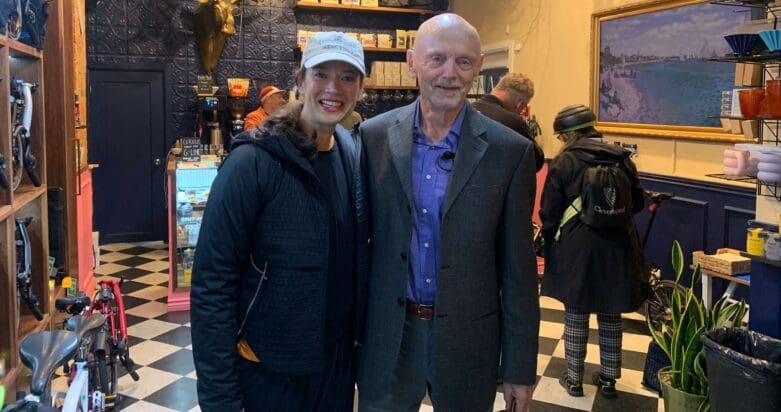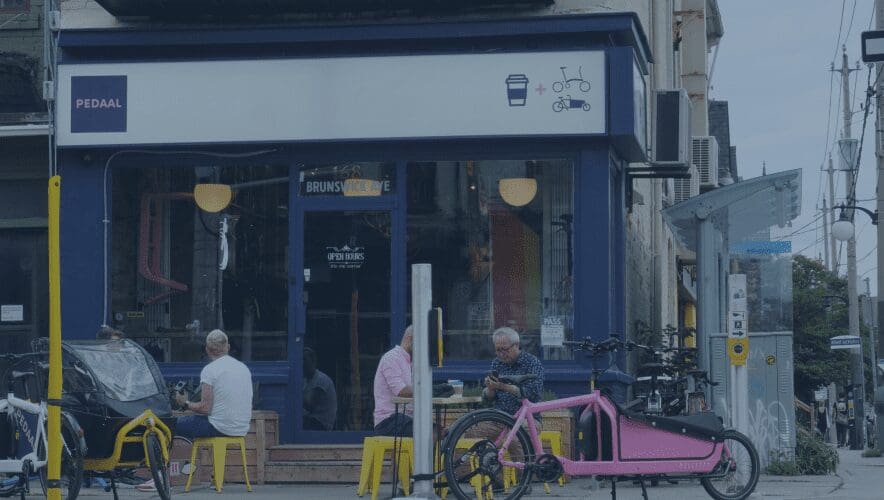September 24th was a quintessentially English day, with brooding clouds and rain that, fortunately, held off—perfect for a Brompton group ride! To add to the atmosphere, we hosted the Brompton Meetup Group and Juliet Scott-Croxford, CEO of Brompton North America. Pedaal began as a conversation with Juliet years ago, with questions about how to build community and retail Bromptons effectively. Hosting Juliet at Pedaal was a moment of history. But, there was far more history going on than that! Read on to learn more.
Full Circle
For us at Pedaal, beginning and ending the Brompton group ride at our shop held special meaning. For us and our longtime customers, the ride symbolized Brompton’s journey forward and its rich Toronto history. To bring this full circle, we wanted to introduce Juliet to a very special guest: the individual who first introduced us to Brompton back in 2006. He can take credit for first importing Brompton to Canada. Well, the real Bromptons anyway…

As many know, the owners of Pedaal played a pivotal role in popularizing Brompton bikes in Canada. We’re grateful for the recognition, yet there’s another story behind it that few know and often goes untold.
Unreal Bromptons
It starts with the late Michael Barry, founder of Bicycle Specialties, a visionary retailer on King Street that offered some of the most niche city cycling products, including the renowned Moulton bikes. Even today, Bicycle Specialties continues to craft the elegant Mariposa Bicycles, now led by Michael Barry Jr., a celebrated Grand Tour cyclist. Toronto’s early love for city bikes was evident, as Bicycle Specialties sold more Moulton AMs any store worldwide, apart from one retailer in Germany. However, they also sold Bromptons—though not exactly genuine ones, but they weren’t fakes either.

In 1992, Brompton attempted a partnership with the Taiwanese brand NeoBike, which ended in a debacle involving lost tooling, patent infringements, legal troubles, and barely-there royalties. These “Bromptons” from NeoBike still inspire many fake models today. Somehow, Mike Barry acquired these NeoBike Bromptons, marking the beginning of Brompton’s history in Toronto. This partnership posed challenges, as NeoBike models used different parts that didn’t fit Brompton replacements, leading to inevitable confusion.
Real Bromptons
A decade later, a dedicated Anglophile named Richard Diver began importing authentic Bromptons from the UK, along with Moulton and Pashley bikes, selling them from his Port Credit garage. In 2006, he approached Eric Kamphof, Pedaal’s co-owner, who was managing Curbside Cycle at the time, about retailing these bikes. With bicycles gaining traction as urban transportation, Curbside—already famous for selling the Kronan bike—was the perfect fit for Diver’s brands.

From there the story of Brompton unfolded in Canada. Together, Timm and Eric – co-owners of Pedaal – popularized Brompton across Canada; and especially in Toronto where small condos and commuter trains are a fact of life.
Inviting Richard to meet the CEO of Brompton was an honour, a moment to celebrate the legacy his efforts created. It’s not often that two people from different chapters in the same story can meet, but we were more than happy to author this.
For the Riders
One of Brompton’s greatest strengths lies in the community it inspires, and it was wonderful for the Brompton community to witness two people from two chapters in Brompton’s Canadian story. Even better was to all come together for a Brompton Group Ride, because riding a Brompton is what it’s all about. At Pedaal, we were grateful witnesses to all of this too. Our story is deeply intertwined with Brompton, and this event was the perfect way to accelerate it into the future.
The Brompton story, is as fascinating as it is eccentric. And, its a bike in constant transition, especially in 2025 – it’s anniversary year. Few other bikes inspire such a passionate following, as evidenced by the Brompton Meetup group that proudly showed the Brompton CEO around our fine city. Interested in learning more? Read our blogs, check out our Brompton selection, shoot us an email at info@pedaal.com, and don’t hesitate to book a sales appointment here!
Best of all, join the Brompton Meetup Group here. It’s a fun group that loves to ride and explore culture. No Brompton required




